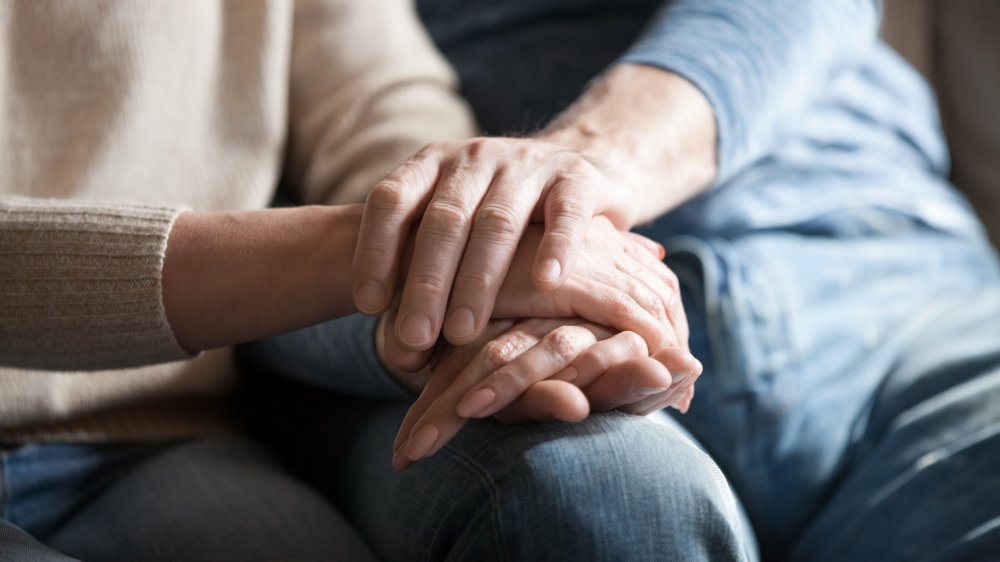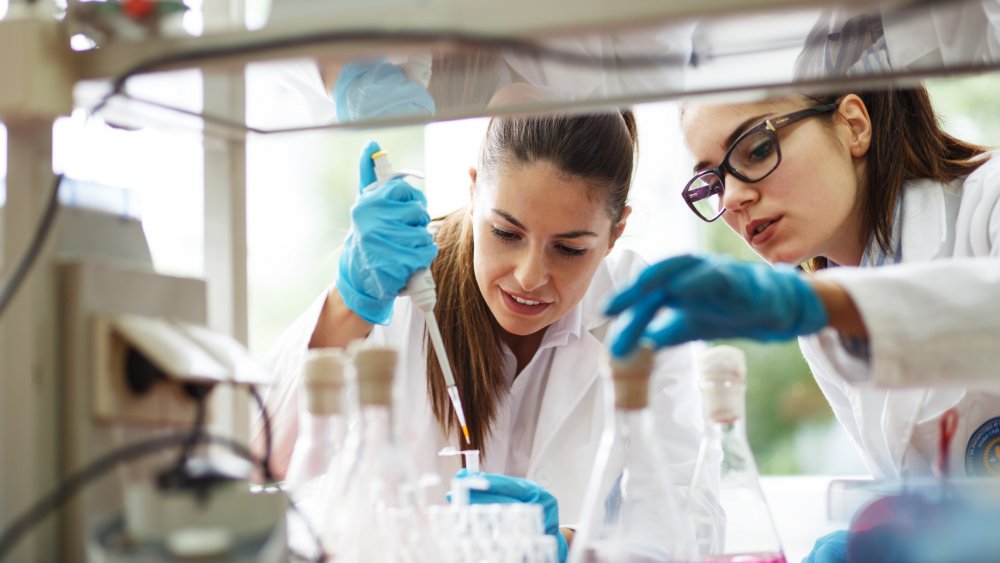When You're In Love, This Is What Really Happens To Your Brain
Falling in love has always been a fascinating phenomenon. The emotion has inspired countless stories, songs, plays, and films over the centuries. True love is often viewed as a magical, mystical thing mired in mystery, but is it? These days love is not as much of an enigma as it was for most of history. In fact, we even know how love affects the brain.
While things like feeling happy around your beloved or getting butterflies seem like some cosmic sign from the universe, they're actually the result of your brain getting up to some pretty interesting stuff. We often think of love as a matter of the heart, but it's very much a matter of the mind, too. Yes, there's a lot going on up there when you fall for someone. According to science, here is exactly what happens to your brain when you put on those love goggles.
When you fall in love, your brain is flooded with dopamine
Falling in love can be a wonderful thing. When we fall in love, we often feel euphoric. It's quite the rush — and this all comes down to the brain. "Falling in love causes our body to release a flood of feel-good chemicals that trigger specific physical reactions," Pat Mumby, co-director of the Loyola Sexual Wellness Clinic, revealed (via ScienceDaily).
One of those "feel-good chemicals" is dopamine, a neurotransmitter which, according to WebMD, is made in the brain through a process in which tyrosine, an amino acid, is turned into a compound called dopa and then turned into dopamine. Dopamine is used by the nervous system to help your nerve cells communicate. It occurs naturally, and has a lot to do with how we experience pleasure. While dopamine is always found in your system, a rush of dopamine is released when you fall in love, making you feel especially happy.
Oxytocin levels rise when you're in love
As noted by Healthline, oxytocin is such a potent hormone and plays such a big role in love that it's known as the "love hormone." This hormone is produced in a part of your brain called the hypothalamus and acts as a neurotransmitter. When you experience attraction to another person, your brain releases dopamine and produces oxytocin, resulting in a wave of happy feelings.
A 2012 study published in Psychoneuroendocrinology found that couples who are in the early stages of a relationship have much higher levels of oxytocin than people who are single. Oxytocin does more than make you feel happy when you're falling in love though. An article published in Current Opinion in Psychiatry suggested that oxytocin may aid in the development of relationships in a number of ways, including the promotion of trust, fidelity, communication, and the formation of positive memories with your beloved.
Outside of romance, oxytocin plays a critical role in reproduction and childbirth. In women, it's what triggers labor and, in males, helps move sperm. As noted by Chatelaine, sex also increases the production of oxytocin.
When in love, your brain may make it difficult to see your partner's faults
An age-old saying claims that love is blind. When you're in love, it can often be hard to see your partner's faults because you are so swept up in the thrill of the romance. While most of us realize that our sweethearts aren't actually perfect, it's not quite wishful thinking that has us overlooking their flaws — it's our brains.
As noted by the Harvard Mahoney Neuroscience Institute, the reason we tend to put our beloved on a pedestal is in part because of the pleasurable feelings love induces. Falling in love "deactivates the neural pathway responsible for negative emotions, such as fear and social judgment." When you fall in love, the parts of your brain that are "responsible for making critical assessments of other people" power down, thus impairing your judgement and putting your partner in a rosier light.
Falling in love can trigger a fight-or-flight response in your brain
When you fall in love, you may feel like your stomach is filled with butterflies. You may be nervous around the object of your affection, your hands may be clammy. There's a reason that your body reacts this way. ScienceDaily noted that when you fall in love, levels of adrenaline and norepinephrine increase in your body.
Per Healthline, adrenaline — also called epinephrine — is referred to as the "fight-or-flight" hormone because it's released during situations in which your brain thinks you need a boost, like in stressful, exciting, or dangerous moments. While love may not seem like a particularly threatening situation, falling in love still triggers a release of adrenaline. That rush of adrenaline makes your heart race, thus moving more blood to your brain and muscles. Healthline noted that norepinephrine is similar to adrenaline and can also boost your heart rate, and it can also increase your blood pressure.
While the feeling of sweaty hands and a racing heart may not be pleasant, the fight-or-flight response evolved to protect humans. Per Harvard Health, the fight-or-flight response is a survival mechanism that "[enables] people and other mammals to react quickly to life-threatening situations."
Your brain aligns with your partner's brain when you're in love
When you fall in love, it can often seem like you and your partner are connected by an invisible bond. There's actually a scientific explanation for why you feel like you and your beloved are on the same wavelength. According to research conducted by neuropsychotherapist Trisha Stratford, two people can become so connected that parts of their nervous systems actually synchronize.
This doesn't just happen with people who are in love, but with other people who are closely connected. Stratford's research was conducted on people during counseling sessions with a therapist. It was discovered that, at a certain point, people interacting reach a "moment of oneness or an altered state" during which "a part of the brain called the parietal lobe is fired into action," Stratford told The Sydney Morning Herald. She added, ”When this happens we can read each other's brains and bodies at a deeper level — a sixth sense.”
While people don't need to have physical contact to experience this synchronization, a study published in Frontiers in Psychiatry found that brain patterns also synchronize when people touch. This means that when two people in a relationship cuddle, their brains are bringing them even closer together.
When you touch the person you love, you might feel less physical pain
Love may not actually be magic, but it can often feel that way. One of the more magical things about being in love is the way that it can actually make you feel less pain. A study published in Proceedings of the National Academy of Sciences of the United States of America found that the synchronization your brain waves undergo when you are touching your loved one can actually comfort them on both an emotional and physical level. The study found that something as simple as holding your partner's hand when they are in pain can increase your empathy as well as cause their pain to diminish.
This "brain-to-brain coupling" was observed in nearly two dozen heterosexual couples between the ages of 23 and 32 who had been together for one year or longer. The study found that simply being together caused a couple to experience synchronicity, but the phenomenon was increased when holding hands. It looks like there may be something to the fairy-tale trope of true love's kiss after all.
Being in love activates the pleasure centers in your brain
Thanks to MRIs, we can actually take a look at the brain to see what happens when we fall in love. According to ScienceDaily, the blood flow to your brain's pleasure centers increases when you are in love. Per Forbes, dopamine also rushes into the pleasure centers, giving you a sort of "high." In short, love is a kind of addiction.
It might not sound romantic, but your brain responds to falling in love in much the same way as it does to other addictions. The attachment you feel to your partner isn't unlike the dependency addicts have on a drug, pushing you to get that fix of love, according to a 2017 study published in Philosophy, Psychiatry, and Psychology. Being around the object of your affections causes those pleasure centers to activate, while being away from them or breaking up can, as noted by Discover, lead to anxiety — much like withdrawal symptoms.
Your brain creates more vasopressin when you're in love
The rush of chemicals that are released when you first fall in love doesn't last forever. As noted by Psychology Today, dopamine levels decrease after about four years into a relationship, as your life with your partner falls into a steadier rhythm. This may make you feel less attracted to your partner, but that doesn't necessarily signal bad news for the future of your relationship. If the relationship is going well, oxytocin and vasopressin take over for dopamine, and play a role in the development of your relationship.
Vasopressin is especially important in helping you form a lasting bond with your partner. Per ScienceDirect, vasopressin "is a small, nonapeptide hormone, synthesized in the hypothalamus." Essentially, vasopressin helps humans bond with one another and makes you want to nurture the relationship, helping to keep a couple close and focused on their future together long after that initial rush of falling in love has passed.
Increased cortisol levels can make you feel anxious when you're in love
Being in love can make one jubilant, but it can also be incredibly stressful. When you fall in love, it may feel like you're anxious all the time. The good news is that this feeling is most likely temporary, and is triggered by a hormone called cortisol. As noted by WebMD, cortisol is a "built-in alarm system" and "your body's main stress hormone." Cortisol is created in the adrenal glands and works with your brain "to control your mood, motivation, and fear."
When you first fall in love, your body creates more cortisol than usual in order to help you deal with this new "crisis," per the Harvard Mahoney Neuroscience Institute. This, in turn, causes levels of the neurotransmitter serotonin to drop, leading to what Harvard Medical School professor Richard Schwartz called "terrors of early love." Schwartz added that after one or two years in a relationship, though, your cortisol and serotonin levels should be back to normal and you should feel less anxious. "The passion is still there, but the stress of it is gone," he said.
When you first fall in love, your brain may fixate on your partner
Love can be incredibly intense, especially at the beginning of a relationship. When you first fall in love, it can often feel like you're obsessed, unable to get your partner off of your mind. You may think about them constantly, and even dream about them. As noted by ScienceDaily, the reason you fixate on your partner when you first fall in love is because of your decreased serotonin levels. Lowered serotonin levels are associated with obsessive-compulsive disorders and can also induce obsessive-like behavior in people who are in love, Mary Lynn, co-director of the Loyola Sexual Wellness Clinic, explained.
While this can be frustrating, there's good news: This fixation typically fades after the early stages of the relationship. As Harvard Medical School professor Richard Schwartz told the Harvard Mahoney Neuroscience Institute, things get back to normal a year or two into a relationship. While this doesn't mean that you don't still care about your partner, it means the intense, consuming obsession should finally ease up.
Changes in your brain make you more reckless when you're in love
Love can make you do impulsive things. While people who are driven to extremes may believe they are doing so because they are simply caught up in the romance, there's actually a scientific reason that people who are in love are more prone to taking big risks. According to a study published in FEBS Letters, there are a couple of things going on inside your head when you're in love that cause you to act this way.
For one, your prefrontal cortex is less active. This part of your brain is involved in decision making, so when you're in love, you may not make the best decisions. Your amygdala is also impacted when you're in love. This part of your brain helps process fear and, when you're in love, it isn't as active. The combination of these two things means that ideas that may have seemed irresponsible or dangerous when you weren't in love seem perfectly fine when your heart belongs to another.
Being in love is linked to less cognitive control
If you have trouble focusing when you're head over heels in love, you're not alone. Many people have problems completing tasks or may be particularly forgetful when they fall for someone. It's not just because they are distracted by daydreams of their beloved, either.
Being in love is actually linked to a reduction in cognitive control, as found by a study published in Motivation and Emotion. The study found that those who were passionately in love experienced "decreased individual efficiency in cognitive control" and had trouble concentrating on everyday tasks such as study or work.
It should be noted that the study focused on people who were in the early stages of a relationship, so if you do find yourself not being able to think clearly when you first fall in love, there's no reason to think that the experience will last forever.
You might experience a brain boost when you're in love
Love may drive you to distraction, but there is one area in which lovebirds have zero trouble focusing their attention: on each other. A 2015 study published in Social Cognitive and Affective Neuroscience found that people who are infatuated with their significant other "have increased attention for their beloved." The study found that "infatuated individuals" more readily remembered details about their sweetheart than they did about their friends.
The science shows that, at least at the beginning of a relationship, your brain becomes a treasure trove of details regarding your partner as "romantic love has profound effects on cognition." This is especially useful as you are getting to know each other and trying to remember everything from your new partner's favorite color to their favorite restaurant.
That's not the only brain boost you may experience when you're in love. When people fall in love, certain regions of the brain see increased activity, as noted by Psychology Today. For women in love, activity in the hippocampus, which is associated with memory, increases. Men, on the other hand, experience increased activity in the visual cortex.
Love can permanently change your brain
Your brain goes through a lot of things when you fall in love. A lot of them are only temporary, though, and the effects tend to stabilize over time as the relationship progresses. You likely won't always feel nervous around your beloved or have trouble focusing, but that doesn't mean that love doesn't have lasting effects. In fact, love can alter your brain forever.
A 2015 article published in Frontiers in Human Neuroscience highlighted a study of people who'd been in happy, long-term heterosexual relationships. It was discovered that areas of the brain that are associated with attachment became activated when participants looked at pictures of their respective partners. Areas of the brain connected to learning, memory, and neurohormones were also activated, while the parts of the brain that are related to anxiety and fear were less active. While it should be noted that the study was quite small and only looked at a handful of couples, the results show that romantic love's effects may just be able to last a lifetime.















